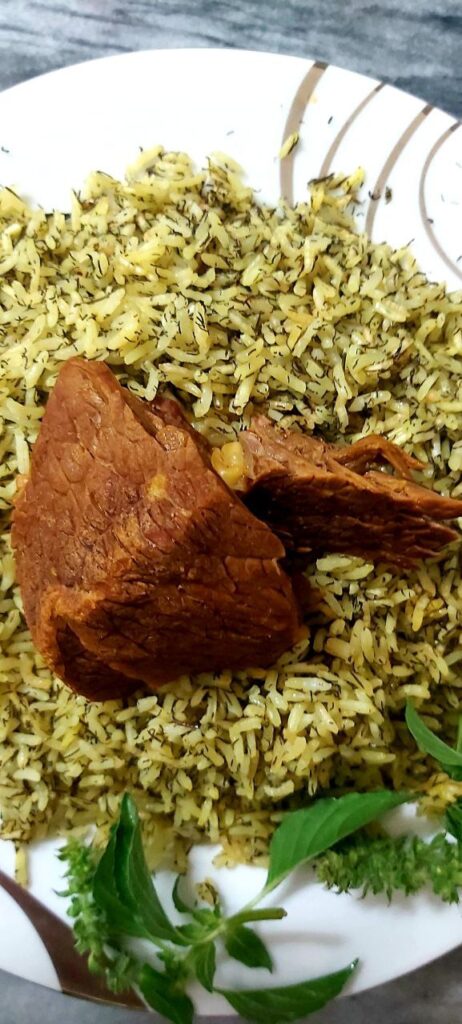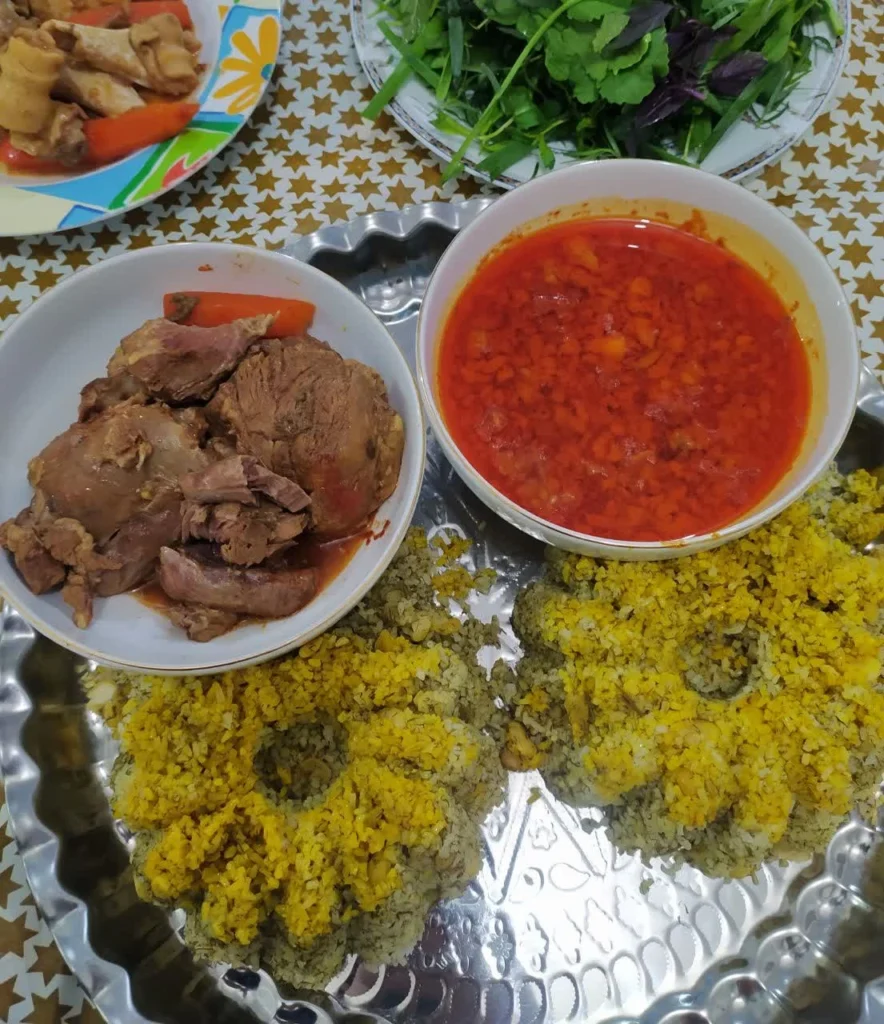Dill Rice with Meat: A Persian Culinary Treasure

Persian cuisine is one of the most diverse and flavorful culinary traditions in the world. Among its many celebrated dishes, dill rice with meat—known in Persian as shevid polo ba gosht—stands out as both a comfort food and a festive dish. This aromatic combination of fluffy basmati rice, fresh dill, and tender meat is a perfect example of how simple ingredients can be elevated into an unforgettable meal. In this article, we will explore the history of this dish, its cultural significance, its nutritional benefits, and finally, provide a detailed guide on how to prepare it in your own kitchen.
The Origins of Dill Rice in Persian Cuisine
Rice has been a staple of Iranian cuisine for centuries, particularly after its introduction from India through ancient trade routes. Over time, Persians developed sophisticated methods of cooking rice, creating layered and fragrant variations that remain unmatched worldwide. Dill, on the other hand, is a widely used herb in Persian cooking due to its fresh, slightly tangy flavor and health-promoting qualities.
The marriage of dill and rice in Persian cuisine created shevid polo, a dish enjoyed on its own or paired with meat. When combined with lamb, beef, or even chicken, it becomes a hearty, satisfying meal suitable for family gatherings and festive occasions.
Cultural Significance
In Iranian households, food is more than just nourishment—it is an expression of hospitality, tradition, and family bonding. Shevid polo ba gosht is often prepared for special occasions, such as Nowruz (the Persian New Year), weddings, or large family dinners. The dish embodies the Persian philosophy of balance: rice provides energy, dill offers freshness and digestion support, while meat adds richness and protein.
It is also common to prepare variations of dill rice with fish, particularly during spring festivities. However, when paired with meat, the dish takes on a deeper, more comforting quality, making it ideal for colder months or celebratory meals.
The Key Ingredients
Basmati Rice – Long-grain rice is essential for Persian cooking. It should be soaked before cooking to achieve the signature fluffy texture.
Dill (Shevid) – Fresh dill is preferred, but dried dill can also be used, especially in winter months. It lends a bright and herbal fragrance.
Meat – Traditionally lamb shanks or beef chunks are used, slow-cooked until tender. Chicken is a lighter alternative.
Spices and Aromatics – Turmeric, saffron, garlic, and onion are commonly added for depth and aroma.
Butter or Oil – To create the iconic tahdig (crispy rice crust) and enhance richness.
Nutritional Benefits
Beyond its delightful flavor, dill rice with meat offers several nutritional advantages:
Rice provides carbohydrates for energy.
Dill is rich in vitamins A and C, as well as antioxidants that promote digestion and reduce inflammation.
Meat supplies essential protein, iron, and B vitamins.
Spices like turmeric and saffron contain powerful anti-inflammatory and mood-boosting properties.
As a result, this dish is both nourishing and satisfying, striking a balance between flavor and health.
Step-by-Step Preparation Guide
Ingredients (Serves 4–6):
3 cups basmati rice
500 g lamb shanks, beef, or chicken
2 large onions, finely chopped
3 cloves garlic, minced
1 large bunch of fresh dill, chopped (or 1 cup dried dill)
½ tsp turmeric
½ tsp ground black pepper
1 tsp salt (to taste)
3 tbsp oil or butter
½ tsp saffron, steeped in hot water (optional)

Instructions:
Prepare the Meat
In a large pot, heat oil and sauté onions until golden. Add turmeric and garlic, stirring to release their aroma.
Add the meat and brown on all sides. Cover with water and simmer gently until tender (about 1.5–2 hours for lamb or beef; 40 minutes for chicken). Season with salt and pepper.
Prepare the Rice
Rinse and soak the rice in salted water for at least 30 minutes.
Boil water in a large pot, then add the soaked rice. Cook until the grains are partially soft but still firm in the center (parboiled). Drain and rinse with cold water.
Layering the Rice and Dill
In a clean pot, add oil or butter and a layer of rice to create the crispy tahdig.
Layer rice with chopped dill, alternating until all rice and dill are used.
Drizzle with saffron water if desired.
Steaming
Cover the pot with a clean towel wrapped around the lid to trap steam. Cook on low heat for 30–40 minutes until the rice is fluffy and aromatic.
Serving
Fluff the rice and transfer to a serving platter.
Place the cooked meat alongside or on top of the rice.
Garnish with extra dill or saffron rice for color.
Serving Suggestions
Traditionally, dill rice with meat is accompanied by yogurt, pickled vegetables (torshi), or fresh herbs (sabzi khordan). A refreshing salad of cucumber and tomato, lightly dressed with lemon juice, balances the richness of the meat.
For a more festive presentation, saffron rice can be sprinkled over the top, creating a golden and fragrant highlight.
Variations
Dill Rice with Fish – A popular alternative during Nowruz, symbolizing renewal and prosperity.
Vegetarian Dill Rice – Replacing meat with beans or lentils creates a protein-rich vegetarian option.
Dried Fruit Addition – Raisins, barberries (zereshk), or walnuts can be added for a sweet-tart balance.
Why You Should Try Dill Rice with Meat
Dill rice with meat represents the essence of Persian cooking: elegance through simplicity. While the ingredients are modest, the technique transforms them into something extraordinary. Every bite offers fragrant rice, earthy dill, and savory meat, making it both comforting and sophisticated.
For those new to Persian cuisine, this dish is an excellent introduction. It demonstrates the central role of rice in Iranian cooking and showcases the delicate use of herbs and spices that distinguish Persian flavors from other Middle Eastern traditions.
Conclusion
Shevid polo ba gosht, or dill rice with meat, is more than just a dish—it is a celebration of Persian culture, history, and hospitality. Whether prepared for a family dinner or a festive holiday, it brings people together around the table to share not just food, but also memories and traditions.
By learning to prepare this recipe at home, you take part in a centuries-old culinary heritage that continues to thrive today. With its balance of nutrition, fragrance, and flavor, dill rice with meat is a timeless dish that deserves a place in every global kitchen.
